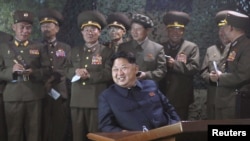The United Nations officially opened a new field office in Seoul Tuesday to document human rights abuses in North Korea. The world body has been trying to increase pressure on the repressive Kim Jong Un regime to end ongoing systematic human rights violations that it calls “without parallel in the contemporary world."
Phil Robertson, with the non-government group Human Rights Watch, called the opening of the U.N.’s field office in Seoul a critical step forward in the campaign to hold North Korea’s leaders accountable for committing crimes against humanity.
“This is something that Kim Jong Un should be staying awake at night thinking about, because he is going to be facing a determined team of professional investigators looking and speaking to people to find out the abuses that are taking place against them,” said Robertson.
International pressure has been intensifying on Pyongyang since the release of a U.N. report last year documenting a network of political prisons in North Korea holding 120,000 people and a list of atrocities that include murder, enslavement, torture, imprisonment, and rape.
The U.N. General Assembly overwhelmingly passed a resolution to refer Pyongyang to the International Criminal Court for crimes against humanity, but the process was stalled in the U.N. Security Council. It has not been brought to a vote there because it is believed that North Korea's allies, China and Russia, would veto any punitive action.
Investigators working in the U.N. human rights field office in Seoul will document further atrocities and cases of abuse inside the North for possible legal action in the future.
Human Rights Watch’s Robertson said North Korean officials at the U.N. initially offered to cooperate in exchange for immunity.
“They also insisted that certain things be granted as a concession upfront to North Korea, that there will be no reference to any sort of leadership accountability. And the international community and the human rights systems don’t work that way,” he said.
Since then, North Korea has responded to human rights criticisms with strong denials, threats of retaliation and further isolation.
This week Pyongyang said it would boycott next month's World University Games in South Korea to protest the opening of the U.N. human rights office in Seoul.
Choi Yong-sang, with the Network for North Korean Democracy and Human Rights, said it important to clarify that the U.N. office in Seoul is looking into abuses by the leadership and is not targeting the people of North Korea.
Choi said the purpose of the activities of the office is to observe Kim Jong Un and other top members who suppress North Koreans’ human rights. They should know, he added, that the activities of the office are not the suppression or isolation of North Koreans.
U.S. Secretary of State John Kerry recently said North Korea has also alienated its allies Russia and China by rejecting overtures to restart talks to end Pyongyang’s nuclear program in exchange for increased aid and development assistance.
In 2013, the United Nations imposed harsh sanctions on the regime after North Korea conducted its third nuclear test.
International food aid, especially from South Korea and the United States, has also been drastically cut.
At the same time the U.N. is trying to pressure the Kim Jong Un regime to curb human rights abuses, the U.N. World Food Program is appealing for over $100 million in food aid for North Korea. The North is suffering through a severe drought that could cause significant food shortages for millions of Koreans.
